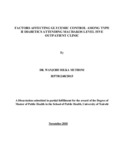| dc.contributor.author | Wanjohi, Milka M | |
| dc.date.accessioned | 2019-01-31T08:27:26Z | |
| dc.date.available | 2019-01-31T08:27:26Z | |
| dc.date.issued | 2018 | |
| dc.identifier.uri | http://hdl.handle.net/11295/106136 | |
| dc.description.abstract | Introduction
Glycemic control refers to the regulation and maintenance of blood glucose levels within a normal range in diabetic patients. Up to 40% of Kenyan Type II diabetic patients on treatment and clinical follow-up have poor glycemic control which is directly associated with the development of diabetes-related complications, morbidity, and mortality. There is however paucity of literature in the characterization of factors affecting glycemic control in Kenya and particularly Machakos County.
Objective
The primary objective of this study was to assess factors affecting glycemic control among Type II diabetic patients attending the Machakos Level Five Outpatient Diabetic Clinic, during the period December 2017-February 2018.
Methodology
The study was an unmatched case-control design, where cases were Type II diabetics with poor glycemic control (average of the last two consecutive fasting blood glucose readings of more than 7.0mmol/l) while controls were Type II diabetics with good glycemic control (average of the last two consecutive fasting blood glucose readings of at least 7.0mmol/l). Structured questionnaires were used to collect data from informed consenting Type II diabetic patients who were selected through simple random sampling. The sample size was 84 patients in each study arm. Multivariable logistic regression was used to evaluate the relationship of the predictors with glycemic control.
xiv
Results
From the multivariable analysis, inappropriate diet (odds ratio: 5.98; 95% confidence interval 1.97-18.10), low physical activity (odds ratio: 2.71; 95% confidence interval 1.05-7.04), and inadequate self-monitoring of blood glucose (odds ratio: 5.35; 95% confidence interval 2.09-13.72) were identified as significant factors associated with poor glycemic control. The absence of diabetes complications was associated with good glycemic control (odds ratio: 0.4; 95% confidence interval 0.17-0.96).
Conclusion
This study concluded that diabetes complications, adherence to recommended diet, physical activity and self-monitoring of blood glucose are significantly associated with glycemic control. These findings call for the need to strengthen advocacy on adherence to dietary recommendations, regular physical exercise, and blood glucose monitoring among Type II diabetics to mitigate the effects of poor glycemic control. Emphasis should be placed on self-care activities in the different age-groups to minimize the occurrence of diabetes complications. Further studies such as a cross-sectional study can be carried out in the study area to determine the prevalence of poor glycemic control. | en_US |
| dc.language.iso | en | en_US |
| dc.publisher | University of Nairobi | en_US |
| dc.rights | Attribution-NonCommercial-NoDerivs 3.0 United States | * |
| dc.rights.uri | http://creativecommons.org/licenses/by-nc-nd/3.0/us/ | * |
| dc.subject | Factors Affecting Glycemic Control Among Type Ii Diabetics Attending Machakos Level Five Outpatient Clinic | en_US |
| dc.title | Factors Affecting Glycemic Control Among Type Ii Diabetics Attending Machakos Level Five Outpatient Clinic | en_US |
| dc.type | Thesis | en_US |
| dc.description.department | a
Department of Psychiatry, University of Nairobi, ; bDepartment of Mental Health, School of Medicine,
Moi University, Eldoret, Kenya | |



